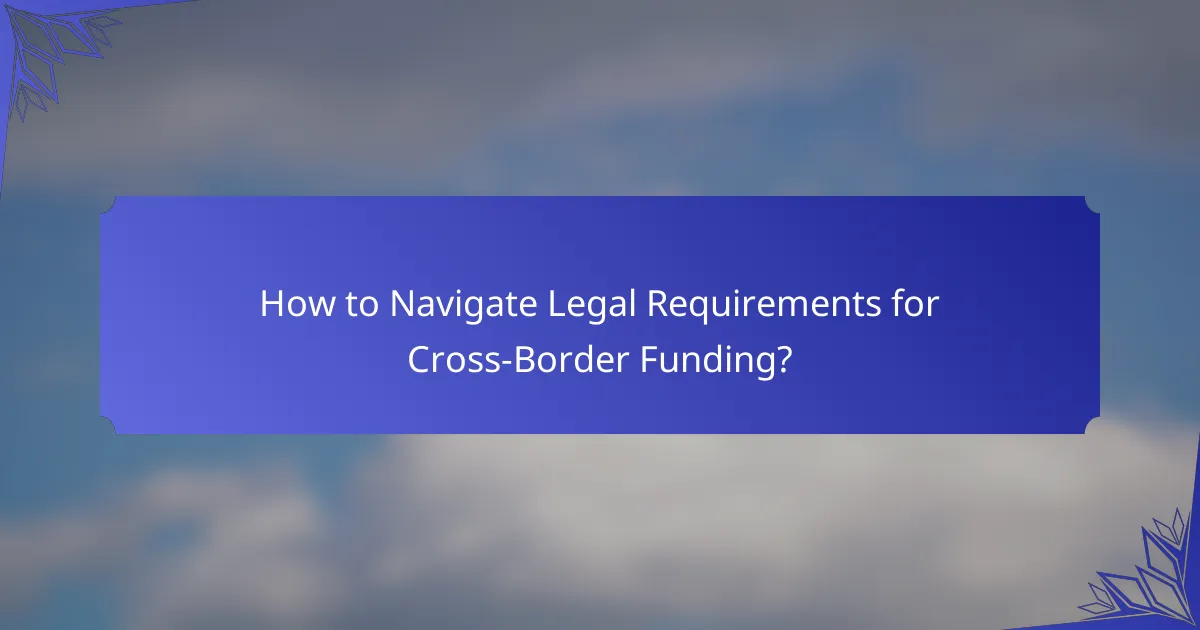Cross-border funding offers a variety of options such as international grants, foreign direct investment, and venture capital, each tailored to different business needs and goals. Understanding the unique characteristics of these funding sources, along with the associated challenges like currency fluctuations and legal compliance, is crucial for making informed decisions. By carefully evaluating your risk tolerance and regulatory requirements, you can enhance your chances of successfully securing the right funding for your venture.

What Are the Best Cross-Border Funding Options?
The best cross-border funding options include international grants, foreign direct investment, cross-border loans, venture capital firms, and angel investors. Each option has unique characteristics and requirements, making it essential to evaluate them based on your specific needs and goals.
International Grants
International grants are funds provided by governments, NGOs, or international organizations that do not require repayment. These grants often support specific projects or initiatives, particularly in sectors like education, health, and environmental sustainability.
To access international grants, organizations typically need to submit detailed proposals outlining project goals, budgets, and expected outcomes. It’s crucial to research grant opportunities thoroughly, as competition can be intense, and eligibility criteria vary widely.
Foreign Direct Investment
Foreign direct investment (FDI) involves capital investment from a company or individual in one country into a business in another country. This option can provide substantial funding and often includes strategic partnerships that enhance business operations.
When seeking FDI, it’s essential to understand the regulatory environment of the host country, as well as the potential for return on investment. Engaging with local partners can also facilitate smoother entry and compliance with local laws.
Cross-Border Loans
Cross-border loans are loans provided by financial institutions in one country to borrowers in another. These loans can be beneficial for businesses looking to expand internationally but often come with higher interest rates and complex terms.
Before pursuing cross-border loans, assess the currency risk and potential fluctuations in exchange rates. It’s advisable to work with financial advisors who understand the nuances of international lending to avoid pitfalls.
Venture Capital Firms
Venture capital firms invest in startups and small businesses with high growth potential in exchange for equity. These firms often provide not just funding but also mentorship and access to networks that can accelerate business growth.
To attract venture capital, businesses should have a solid business plan, a clear value proposition, and a scalable model. Networking within industry circles and attending pitch events can enhance visibility to potential investors.
Angel Investors
Angel investors are affluent individuals who provide capital to startups, usually in exchange for convertible debt or ownership equity. They often invest in early-stage companies and can offer valuable advice and connections.
When seeking angel investment, focus on building relationships and demonstrating your business’s potential. Prepare a compelling pitch that highlights your unique selling points and market opportunity to capture their interest effectively.

How to Choose the Right Funding Strategy?
Selecting the right funding strategy involves understanding your business needs, evaluating your risk tolerance, and being aware of regulatory requirements. A well-informed choice can enhance your chances of success in cross-border funding.
Assessing Business Needs
Begin by clearly defining your funding requirements. Consider factors such as the amount needed, the purpose of the funds, and the timeline for usage. For instance, a startup may require a small amount for initial operations, while an established business might seek larger sums for expansion.
Identify whether you need short-term or long-term funding. Short-term funding might be suitable for immediate operational costs, while long-term funding can support growth initiatives. Align your funding strategy with your business objectives to ensure it meets your specific needs.
Evaluating Risk Tolerance
Your risk tolerance will significantly influence your funding strategy. Assess how much risk you are willing to take regarding debt versus equity financing. Debt financing, while potentially less expensive, requires regular repayments, which can strain cash flow.
Consider the potential impact of market fluctuations on your business. If you are in a volatile industry, you may prefer equity financing, which does not require immediate repayment but dilutes ownership. Understanding your comfort level with risk will help you choose a strategy that aligns with your financial goals.
Understanding Regulatory Requirements
Familiarize yourself with the regulatory landscape in both your home country and the target market. Different countries have varying rules regarding foreign investments, taxation, and compliance that can affect your funding strategy.
For example, the European Union has specific regulations governing cross-border funding, including the need for transparency and adherence to anti-money laundering laws. Consult with legal experts to ensure compliance and avoid potential pitfalls that could derail your funding efforts.

What Are the Key Challenges in Cross-Border Funding?
Cross-border funding presents several challenges that can complicate investment and financing efforts. Key issues include currency fluctuations, legal compliance, and cultural differences, all of which require careful consideration to navigate successfully.
Currency Fluctuations
Currency fluctuations can significantly impact the value of investments and returns in cross-border funding. When dealing with multiple currencies, changes in exchange rates can lead to unexpected gains or losses, affecting overall profitability.
To mitigate risks associated with currency fluctuations, consider using hedging strategies such as forward contracts or options. These tools can help lock in exchange rates and provide more predictability in financial outcomes.
Legal Compliance
Legal compliance is crucial in cross-border funding, as different countries have varying regulations governing foreign investments. Understanding local laws, including tax implications and reporting requirements, is essential to avoid legal pitfalls.
Engaging local legal experts can provide valuable insights into compliance issues. Additionally, staying informed about international treaties and agreements can help streamline the funding process and reduce regulatory hurdles.
Cultural Differences
Cultural differences can influence business practices and communication styles in cross-border funding. Misunderstandings arising from these differences can hinder negotiations and affect relationship-building with international partners.
To navigate cultural differences effectively, invest time in understanding the local customs and business etiquette of your target market. This can enhance collaboration and foster trust, ultimately leading to more successful funding outcomes.

How to Navigate Legal Requirements for Cross-Border Funding?
Navigating legal requirements for cross-border funding involves understanding the regulations that govern international financial transactions. Key considerations include tax implications, compliance with local laws, and the legal frameworks of the countries involved.
Understanding Tax Implications
Tax implications can significantly affect the viability of cross-border funding. Different countries have varying tax rates and regulations that can influence the overall cost of funding, including withholding taxes on interest and dividends.
For instance, if a U.S. company receives funding from a European investor, it may face withholding taxes ranging from 15% to 30% depending on the tax treaty between the two countries. It’s crucial to consult with tax professionals to optimize tax liabilities and ensure compliance.
Compliance with Local Laws
Compliance with local laws is essential when engaging in cross-border funding. Each country has its own set of regulations governing foreign investments, which can include registration requirements, reporting obligations, and restrictions on foreign ownership.
For example, some countries may require foreign investors to obtain specific licenses or permits before providing funding. Failing to comply with these regulations can lead to legal penalties or the inability to enforce contracts. Always conduct thorough due diligence and consider engaging local legal experts to navigate these complexities effectively.

What Are the Best Practices for Securing Cross-Border Funding?
Securing cross-border funding requires strategic planning and a clear understanding of international markets. Best practices include building strong relationships with investors, preparing detailed business plans, and leveraging local expertise to navigate regulatory environments.
Building Relationships with International Investors
Establishing relationships with international investors is crucial for securing cross-border funding. Networking through industry events, conferences, and online platforms can help you connect with potential backers who understand your market.
Consider reaching out to investors who have previously funded similar ventures or who have a vested interest in your industry. Personal introductions or referrals can significantly enhance your credibility and increase the likelihood of securing investment.
Preparing Comprehensive Business Plans
A well-prepared business plan is essential for attracting cross-border funding. Your plan should clearly outline your business model, market analysis, financial projections, and funding requirements. Tailor your plan to address the specific interests of international investors.
Include details about how you plan to manage currency risks and comply with local regulations. Providing a clear exit strategy can also reassure investors about their potential returns.
Utilizing Local Expertise
Engaging local experts can provide invaluable insights into the regulatory landscape and market dynamics of the country where you seek funding. Local consultants or legal advisors can help navigate complex regulations and ensure compliance with local laws.
Additionally, local expertise can assist in identifying potential investors and understanding cultural nuances that may affect negotiations. This can significantly improve your chances of securing the necessary funding while minimizing risks.

How to Leverage Technology in Cross-Border Funding?
Leveraging technology in cross-border funding involves utilizing innovative tools and platforms to enhance efficiency, transparency, and security in financial transactions across borders. Key technologies like blockchain and fintech platforms can streamline processes and reduce costs, making international funding more accessible.
Using Blockchain for Transparency
Blockchain technology offers a decentralized ledger that enhances transparency in cross-border funding. Each transaction is recorded in a secure and immutable manner, allowing all parties to verify and trace the flow of funds easily.
For example, using blockchain can significantly reduce the risk of fraud and errors, as all transactions are visible to authorized users. This transparency can foster trust among investors and recipients, which is crucial in international dealings.
When considering blockchain for funding, ensure compliance with local regulations and standards, as these can vary widely by country. Familiarize yourself with the legal frameworks governing cryptocurrency and blockchain in your target markets.
Fintech Platforms for Easier Transactions
Fintech platforms simplify cross-border funding by providing user-friendly interfaces and efficient transaction processing. These platforms often offer competitive exchange rates and lower fees compared to traditional banks, making them an attractive option for businesses and individuals.
Popular fintech solutions may include services like TransferWise (now Wise), Revolut, and PayPal, which facilitate quick transfers with minimal hassle. Many of these platforms support multiple currencies, allowing users to transact in their preferred currency without incurring excessive conversion costs.
When selecting a fintech platform, consider factors such as transaction speed, fees, and customer support. It’s also wise to check for any limits on transaction amounts, especially for larger funding needs, to avoid delays or complications.


